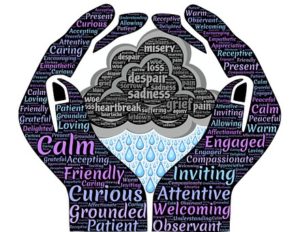POSTED IN: General Info
TAGS: Aging Well, Alzheimer's Disease, Caregiving, Coping
Share this
Caregivers commonly have feelings of loss and grief as their life is changed by Alzheimer’s. You are entitled to these emotions and may start to experience them as soon as you learn of the diagnosis. Share your feelings and seek support as you go through this process, as it is normal to feel loss when you care about someone who has Alzheimer’s. It is also normal to feel guilty, abandoned and angry. Alzheimer’s gradually takes away the person you know and love. As this happens, you’ll mourn him or her and may experience the different phases of grieving: denial, anger, guilt, sadness and acceptance. The stages of grief don’t happen neatly in order. You may move in and out of different stages as time goes on. Some common experiences in the grieving process include:
Denial – Includes hoping that the person is not ill, expecting the person to get better, convincing yourself that the person hasn’t changed and attempting to normalize problematic behaviors. Anger – You may be frustrated with the person, resent the demands of caregiving, resent family members who cannot or will not help provide care and feel abandoned. Guilt – (1) Having unrealistic expectations with thoughts like: “I should have done…” “I must do everything for him or her” or “I must visit him or her every day.” (2) Feeling bad because you’re still able to enjoy life. (3) Having negative thoughts about the person or wishing that he or she would go away or die. (4) Regretting things about your relationship before the diagnosis. Sadness – Feeling overwhelmed by loss, crying frequently, withdrawing from social activities or needing to connect more frequently with others, and withholding your emotions or displaying them more openly than usual. Acceptance: Learning to live in the moment; finding personal meaning in caring for someone who is terminally ill; understanding how the grieving process affects your life; appreciating the personal growth that comes from surviving loss; and finding your sense of humor.
There are ways to cope with grief and loss:
Face your feelings. Think about all of your feelings — positive as well as negative. Let yourself be as sad as you want. Work through your anger and frustration. These are healthy emotions. Know that it is common to feel conflicting emotions. It’s okay to feel love and anger at the same time.
Additional coping skills: Prepare to experience feelings of loss more than once and claim the grieving process as your own. Talk with someone you trust about your grief, guilt and anger. Combat feelings of isolation and loneliness; join a support group. Know that some people may not understand your grief. Accept yourself. And most importantly, take care of yourself. The best thing you can do for the person you are caring for is to stay healthy. This includes taking care of your physical, mental and emotional well-being. Create balance in your life. Do things that bring joy and comfort, and give yourself time to rest. Call 24/7 Helpline: 800-272-3900 and subscribe to weekly e-newsletter. From https://www.alz.org/care/alzheimers-dementia-grief-loss.asp
Share this
Subscribe to our blog and monthly newsletter.











